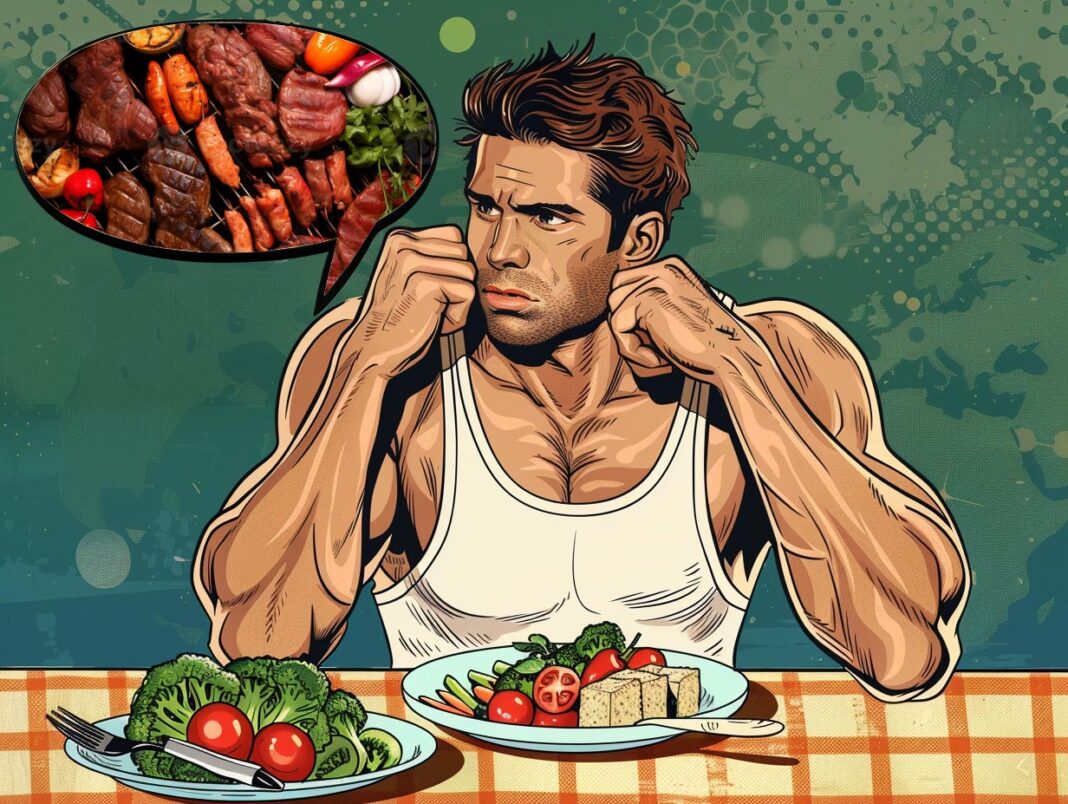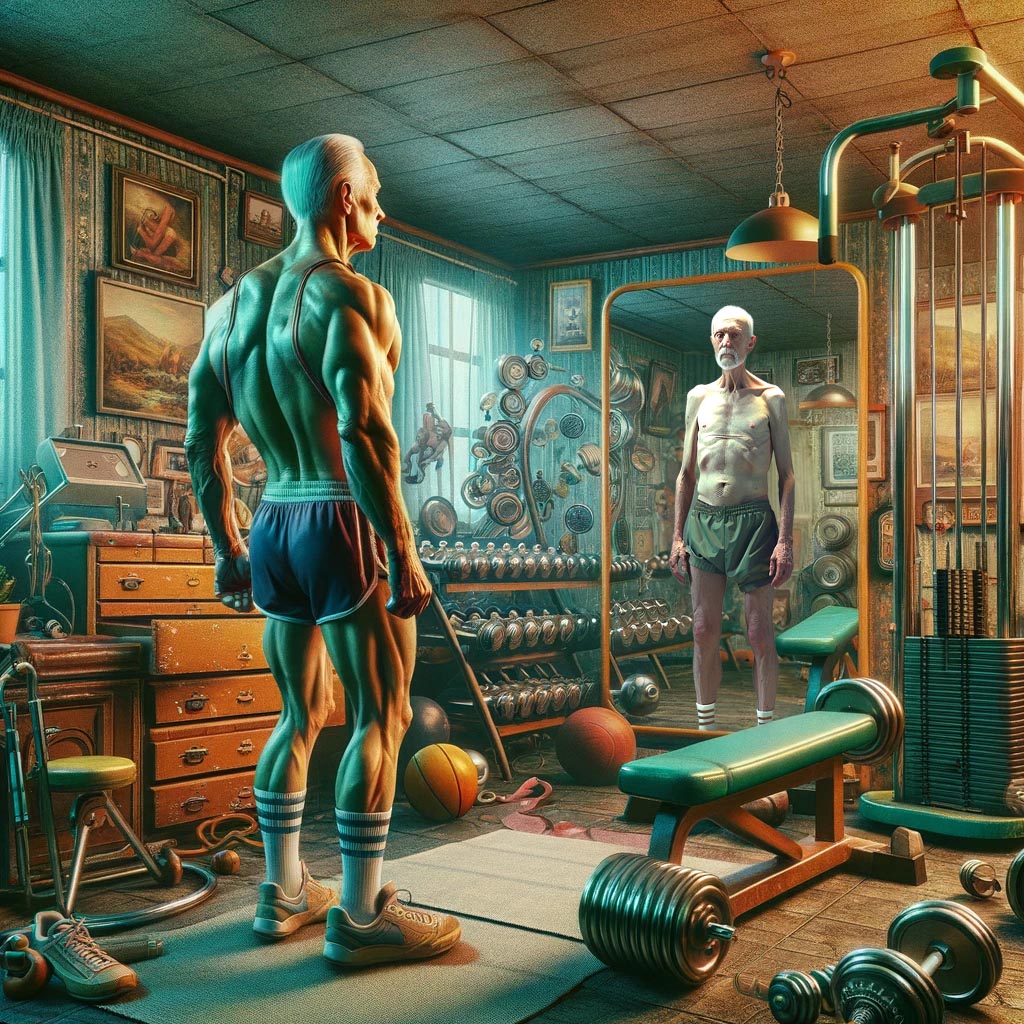The Great Protein Debate
Picture this: a beefy bodybuilder, veins popping, chugging raw eggs and tearing into a bloody steak. It’s the classic image of muscle-building, right? But hold on, there’s a new contender in town, and it’s not what you’d expect. Enter the world of plant-based bodybuilding, where tofu is the new T-bone and kale is king. That’s right, we’re talking about beefing up without the beef. In this protein-packed article, we’ll explore the myths, the science, and the success stories behind this growing trend. So, put down that steak knife, and let’s look into the great protein debate. Can you really build muscle on a diet that’s more “green giant” than “lean giant”?
Myth-Busting: Tofu vs. Steak Showdown
Let’s address the elephant in the room: can you really build muscle on a diet that’s more suited for rabbits than bodybuilders? The answer may surprise you. While the idea of swapping your steak for a slab of tofu might seem like a one-way ticket to Shrimpsville, the truth is, plant-based proteins can be just as effective for muscle growth.
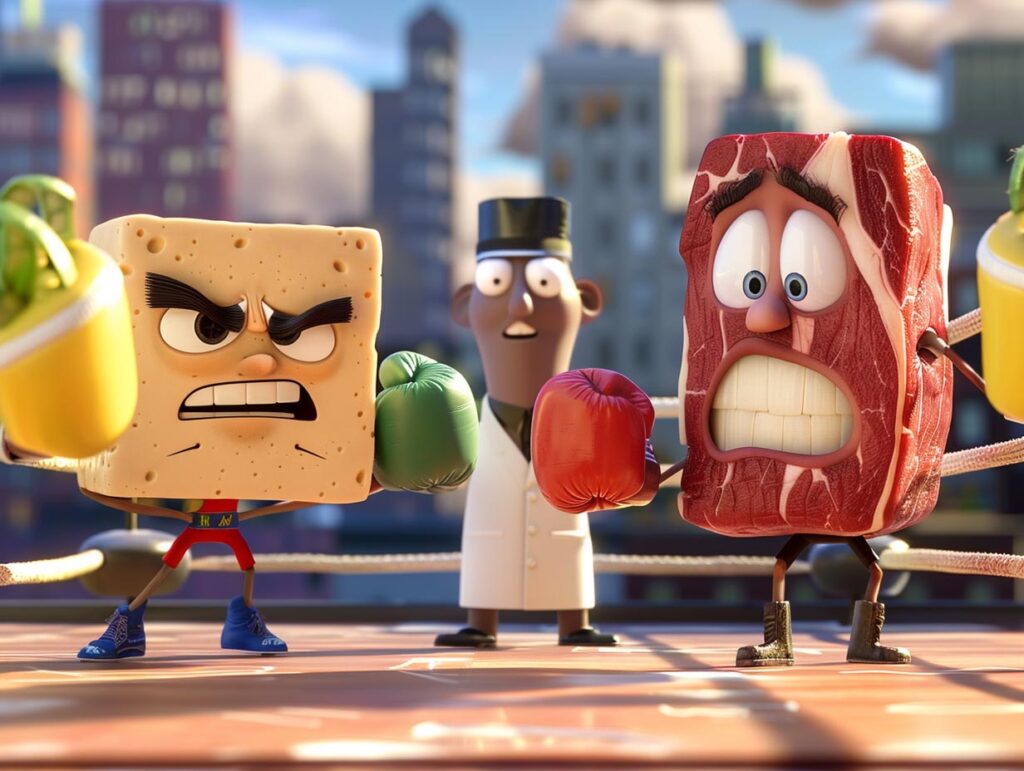
Let’s break it down: a 100g serving of tofu packs in about 10g of protein, while the same amount of steak offers around 25g. So, yes, you’d need to eat more tofu to get the same protein kick. But here’s the kicker: tofu is lower in calories and fat, meaning you can chow down on more of it without worrying about your waistline. Plus, it’s packed with other nutrients like iron, calcium, and fiber, which are all crucial for muscle growth and overall health.
Now, I know what you’re thinking: “But bro, I need my amino acids!” Well, guess what? Plant-based proteins like tofu, lentils, and quinoa contain all nine essential amino acids needed for muscle growth. So, while you might need to mix and match your plant proteins a bit more than your meat-eating gym buddies, you can still get all the building blocks you need for those gains.
Green Giants: Success Stories from the Veggie World
You might think that plant-powered muscles are a myth, but tell that to Patrik Baboumian. This German strongman and former bodybuilder has been breaking records left and right, all while following a strictly vegan diet. In 2013, he set the world record for the most weight ever carried by a human being, shouldering a staggering 555kg. That’s the equivalent of a small car, folks. And he did it all without a single steak in sight.
Then there’s Nimai Delgado, an IFBB Pro bodybuilder who’s never eaten meat in his life. He’s living proof that you can build an impressive physique on a plant-based diet. And let’s not forget about Venus Williams, the tennis superstar who’s been crushing it on the court while following a raw vegan diet.
These plant-powered athletes are just the tip of the iceberg. There’s a growing community of bodybuilders, powerlifters, and fitness enthusiasts who are proving that you don’t need to eat meat to build muscle. And while the idea of giving up your post-workout chicken breast might seem daunting, these success stories show that it’s not only possible but can even give you a competitive edge.
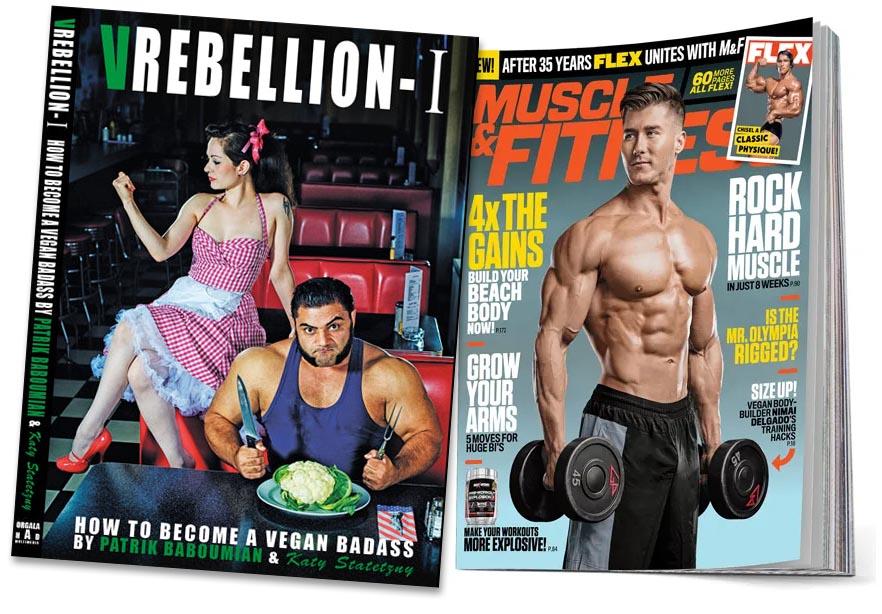
The Science of Sprouts: How Plants Fuel Muscle Growth
How exactly do plants fuel muscle growth? It all comes down to amino acids, the building blocks of protein. When you eat protein, whether it’s from plants or animals, your body breaks it down into amino acids, which are then used to repair and build muscle tissue.
Now, here’s where things get interesting. Animal proteins like meat, eggs, and dairy are considered “complete” proteins because they contain all nine essential amino acids in the right proportions. Plant proteins, on the other hand, are often lacking in one or more of these essential amino acids. But before you start panicking, let me tell you a secret: you don’t need to get all your amino acids in one sitting.
Your body is smarter than you think. It has this nifty little trick called “protein pooling,” where it stores amino acids from different meals and combines them as needed. So, as long as you’re eating a variety of plant-based proteins throughout the day, you’ll be getting all the essential amino acids your muscles crave.
But wait, there’s more! Plants have a few other tricks up their sleeves when it comes to muscle growth. Take leucine, for example. This amino acid is a key player in triggering muscle protein synthesis, and it’s found in high amounts in soy protein, which is often used in plant-based protein powders.
Plants are also packed with antioxidants and anti-inflammatory compounds, which can help reduce muscle damage and soreness after a tough workout. And let’s not forget about fiber, which can help keep you feeling full and satisfied, making it easier to stick to your diet plan.
So, while plant-based muscle building might require a bit more planning and variety than a traditional meat-based diet, the science is clear: plants have the power to fuel muscle growth, and they come with a host of other health benefits to boot.
Plant-Powered Meal Plan: Eating Your Way to Bigger Biceps
So, you’ve decided to take the plant-powered plunge and see if you can build muscle on a veggie-based diet. But where do you start? Don’t worry, we’ve got you covered with this cheeky guide to a plant-based meal plan that’ll have your biceps bulging in no time.
First up, breakfast. Forget about bacon and eggs; we’re talking “Tofu Scramble Surprise.” Sautée some firm tofu with veggies, spices, and a sprinkle of nutritional yeast for a protein-packed start to your day. Pair it with a slice of “Popeye’s Power Bread,” aka whole-grain toast slathered with almond butter and spinach leaves.
For lunch, it’s time to get your “Quinoa Gains” on. Cook up a batch of this protein-rich grain and mix it with black beans, roasted veggies, and a zesty lime dressing. It’s like a burrito bowl, minus the meat sweats.
When it comes to dinner, we’re not messing around. Say hello to your new best friend, the “Lentil Lasagna.” Layer cooked lentils, marinara sauce, and vegan ricotta cheese between whole-grain lasagna noodles for a muscle-building masterpiece. Serve it up with a side of “Broccoli Biceps,” steamed broccoli drizzled with a tahini lemon sauce.
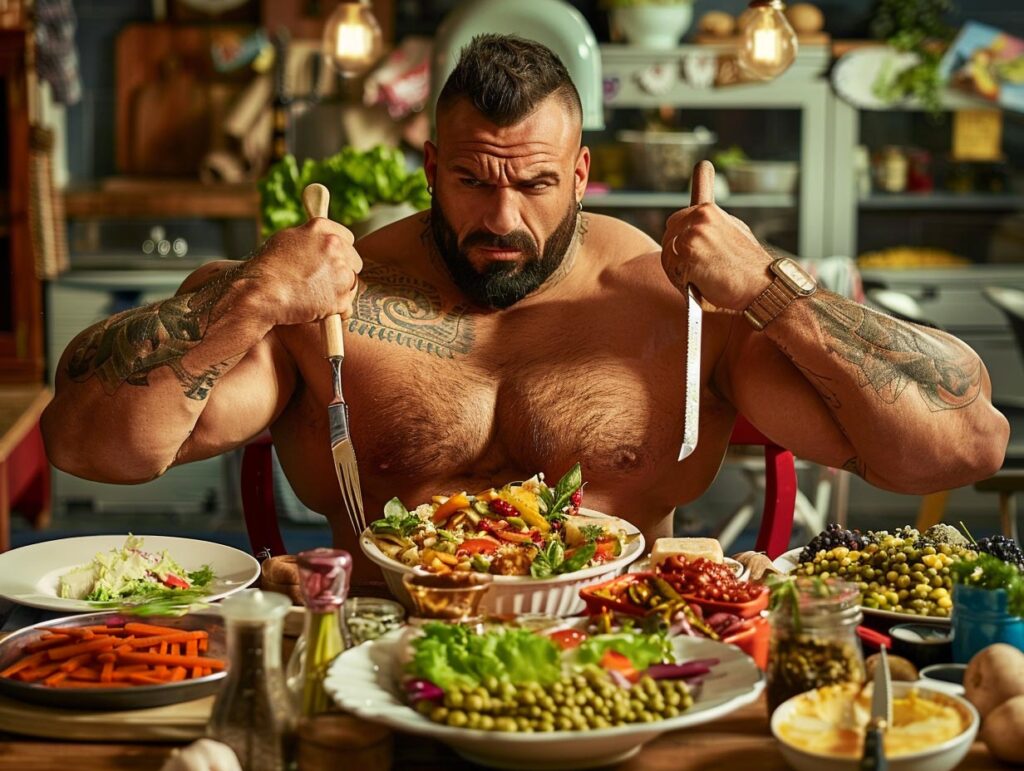
And let’s not forget about snacks. Keep your hunger at bay with “Hummus Hulk Dip” and veggie sticks, or whip up a batch of “No-Whey Protein Balls” using plant-based protein powder, oats, and nut butter.
With a meal plan like this, you’ll be well on your way to plant-powered gains. Just remember, variety is key, so don’t be afraid to mix it up and experiment with different plant-based proteins and recipes. Your taste buds (and your muscles) will thank you.
Supplements and Strategies: The Secret Sauce
Let’s talk supplements. I know, I know, you’re probably thinking, “Oh great, another plant-based bodybuilder going on about their fancy powders and potions.” But hear me out.
While a well-rounded plant-based diet can provide all the nutrients you need for muscle growth, there are a few supplements that can give you an extra edge. First up, B12. This vitamin is essential for energy metabolism and nervous system function, and it’s primarily found in animal products. So, if you’re going full-on plant mode, a B12 supplement is a must.
Next, let’s talk iron. Iron is crucial for oxygen transport and energy production, and plant-based sources of iron (like spinach and lentils) aren’t as easily absorbed as animal sources. So, pairing your plant-based iron sources with vitamin C (think: citrus fruits, bell peppers) can help boost absorption.
And of course, there’s protein powder. While whole food plant-based proteins are great, a vegan protein powder can be a convenient way to bump up your intake, especially post-workout. Look for powders that combine multiple plant-based protein sources (like pea, rice, and hemp) to ensure you’re getting a complete amino acid profile.
But remember, supplements are just that: supplements. They’re not magic bullets, and they can’t replace a balanced diet and consistent training. So, focus on whole foods first, and use supplements as the secret sauce to optimize your plant-powered gains.
Overcoming Challenges: The Meaty Obstacles in Your Path
So, you’re sold on the idea of plant-based muscle building, but you’re worried about the challenges that come with it. Trust me, I get it. Navigating a meat-centric world as a veggie-loving bodybuilder can be tougher than squatting with a coconut between your knees.
Eating out can be a minefield, with “meatless options” often limited to a sad side salad or a plate of fries. But don’t despair! Most restaurants are more than happy to whip up a custom veggie-packed dish if you ask nicely. And if all else fails, there’s always the trusty “I’ll have the burger, hold the burger” trick.
Then there are the skeptics, the ones who look at you like you’ve just told them you’re training for a marathon on the moon. My advice? Kill them with kindness (and maybe a flex or two). Share your success stories, offer to cook them a plant-based meal that’ll blow their mind, and remember that you’re doing this for you, not for their approval.
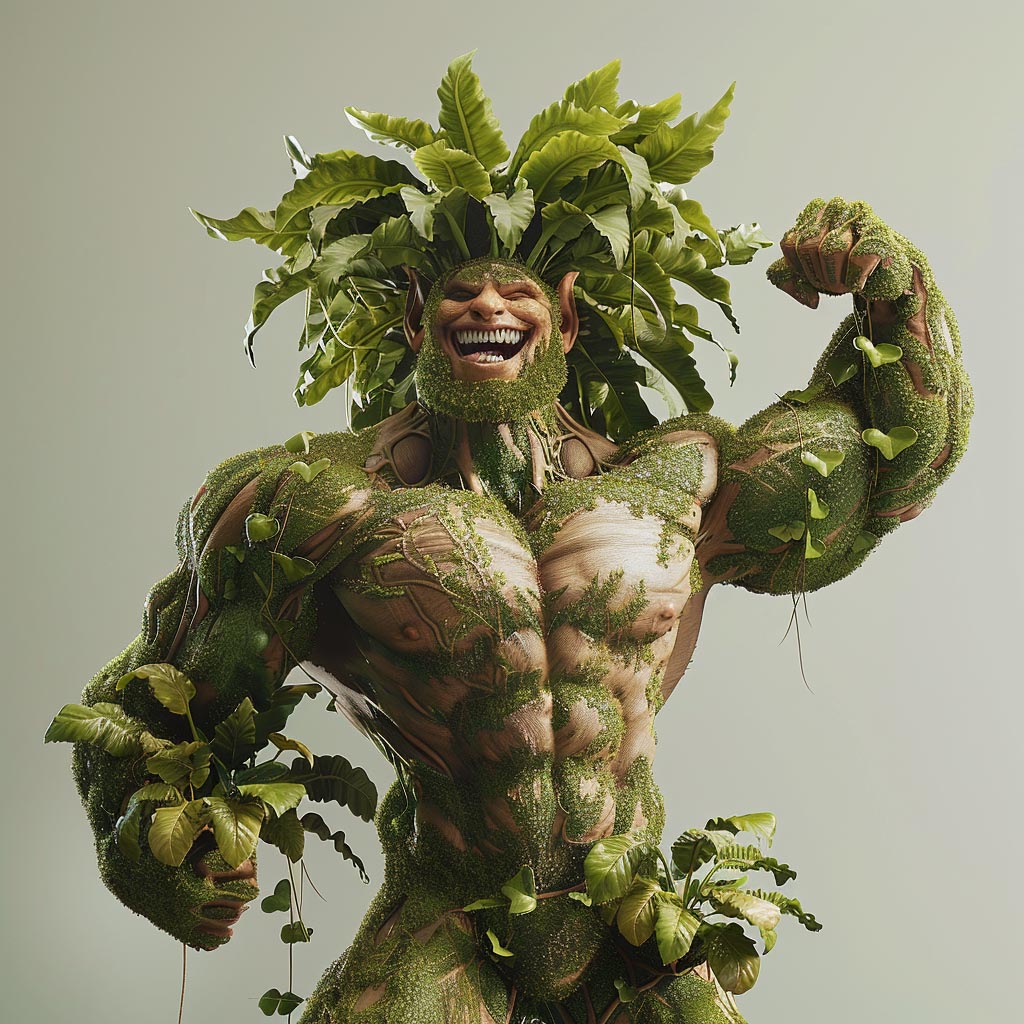
And finally, there’s the grocery shopping learning curve. Navigating the world of tofu, tempeh, and seitan can be overwhelming at first, but trust me, it gets easier. Stick to the perimeter of the store where the whole foods live, and don’t be afraid to experiment with new ingredients. Before you know it, you’ll be a plant-based shopping pro.
The Verdict on Veggie Muscles
Well, there you have it. The verdict is in, and it’s looking pretty green. Building muscle on a plant-based diet isn’t just possible; it’s a powerful way to optimize your health and performance. With the right mix of protein, nutrients, and training, you can craft a physique that’s as impressive as it is compassionate.
So, whether you’re a full-time herbivore or just looking to add more plants to your plate, remember that the key to success is variety, consistency, and a good sense of humor. Because let’s face it, there’s nothing funnier than watching a tofu-powered bodybuilder outlifting a steak-eating skeptic. Plant power for the win!
| Interesting Facts Regarding Vegan Bodybuilding |
| A study published in the American Journal of Clinical Nutrition found that plant-based protein sources, such as beans, lentils, and tofu, can be just as effective as animal-based proteins for building muscle mass and strength. (Source: American Journal of Clinical Nutrition, https://academic.oup.com/ajcn/article/105/3/714/4569695) |
| According to a survey by the Plant Based Foods Association, U.S. retail sales of plant-based foods grew 11.4% in 2019, bringing the total plant-based market value to $5 billion. (Source: Plant Based Foods Association, https://www.plantbasedfoods.org/2020-state-of-the-industry-report/) |
| A 2019 study published in the journal Nutrients found that a plant-based diet can provide all the essential amino acids needed for muscle growth and repair, as long as a variety of plant protein sources are consumed throughout the day. (Source: Nutrients, https://www.mdpi.com/2072-6643/11/8/1825) |
| In a 2017 study, researchers found that plant-based diets can be effective for weight management and may help reduce the risk of certain chronic diseases, such as heart disease and type 2 diabetes. (Source: Journal of Geriatric Cardiology, https://www.ncbi.nlm.nih.gov/pmc/articles/PMC5466943/) |
| The Academy of Nutrition and Dietetics states that well-planned vegetarian and vegan diets can be nutritionally adequate and may provide health benefits for the prevention and treatment of certain diseases. (Source: Academy of Nutrition and Dietetics, https://pubmed.ncbi.nlm.nih.gov/27886704/) |


